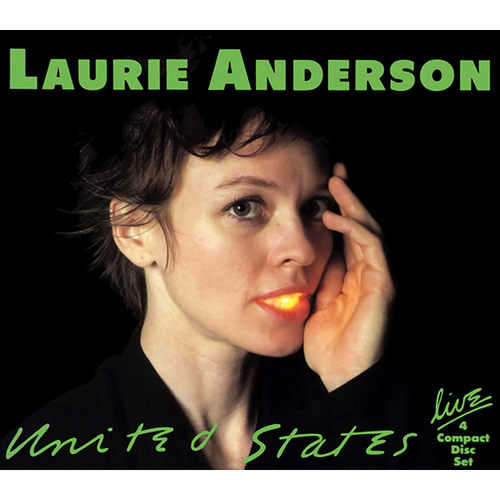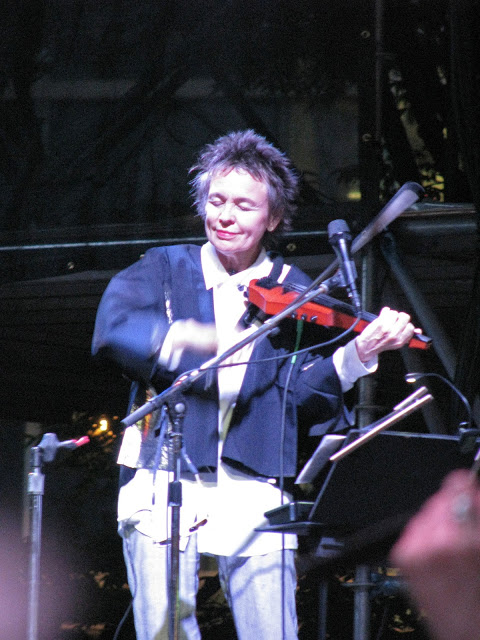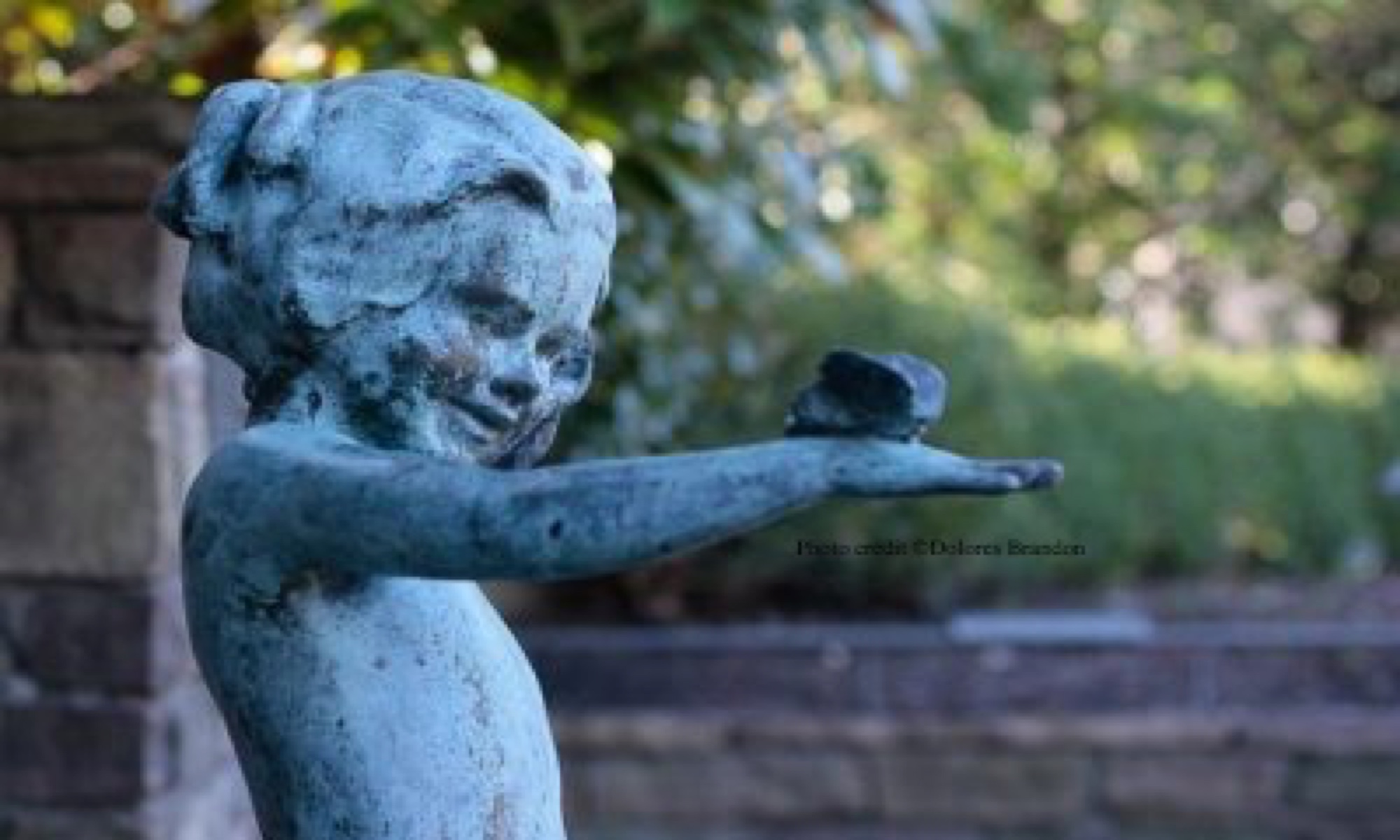
Excerpts from the interview were intercut within a densely layered audio construct of spoken word and music. I was fortunate to have the final mix realized by Stephen Erickson – Audio Engineer/Artist extraordinaire.
The music I included was selected from Anderson’s recorded discography available in 1987: Big Science, Home of the Brave, Mister Heartbreak, The United States LIVE – whatever I could get my hands on.
In her own words: (Interview Highlights)
BRANDON: [When I listen to your music] I have a sense that [I’m listening] to a precocious child left alone in big empty room to practice the violin, the piano, whatever – (laughter); she gets bored and starts to “play”.
ANDERSON: (Laughter) Wait a second, wait a second here. [It’s true] there are a lot of infantile things about [creative] work in general because it is play and you just figure out what’s going to sound good, look good and that often just comes out not from an idea, but [from] a sound or a gesture; how that idea looks in the physical world; otherwise art’s just a list of – you know – concepts or emotions.
BRANDON: I find the violin work you do is just exquisite; your whole being pours into that in a completely unself-conscious, abandoned way.

ANDERSON: Well, it’s a very physical instrument; I mean you can hold it, that’s what I like about it. Usually I work out parts on keyboards (if they are more rhythmic). And, that can get kind of wooden. Keyboards always remind me of driving a car which is – you’re behind this dashboard, you’ve got all these pedals you’re working and (laughter), you’ve got this point of view and you’re going somewhere – it really is driving. [But] the violin is holding and walking; it’s much more of a strolling – table for two type of thing.
The musical lines that I feel closest to are either wind instruments or violin. Saxophone is probably my favorite instrument. Maybe it’s because they [wind and violin] can both wail. Maybe it’s the grief aspect that they bring out. The sax can be jollier than the violin; the violin even when it’s trying to be jolly like Swedish double fiddle pieces – it’s still a little bit mournful. The best it can be is grand as in Tchaikovsky, but it can’t really be that chipper.
BRANDON: What prompted you to move from the acoustic violin to the electronic?
ANDERSON: Well at the same point I moved my voice from acoustic to electronic, I moved everything to some kind of blend of acoustic and electronic. Probably I like that best – because it refers to a lot of things that the songs and stories are about: how people relate to machines. If the instrument is both [electronic and acoustic] it reinforces that idea.
BRANDON: You seem to be incredibly comfortable in this time
ANDERSON: (Laughter) What twelve-thirty on Sunday?
BRANDON: (Laughter) No, in this era. You appear to] have your finger on the pulse of the time in a sense. You have reasonably broad public appeal.
ANDERSON: Well, I try to jump out of time; I mean I try to understand it. A lot of things I’ve written lately are about that – about a sense of time and trying to slow it. I like to try and see what very ancient things look and sound like when they are put in a totally different context.
For example – the score that I’m working on now for SWIMMING TO CAMBODIA (a film of Spalding Grey’s monologues directed by Jonathan Demme) jumps around a lot in time too. [The narrative says a lot] about the sixties – Kent State and politics and things that are just starting to become issues again. One of the choices I made early in the writing of that was just never to use any Cambodian or Vietnamese instruments or any sounds [typically associated with that culture] like little bells and things. Instead [I chose to] use bagpipes, accordion and things that are from completely another culture.
The point is cultural imperialism and that’s how we’ve been exporting it – electronically. I mean we’re not the British – we did not send our culture out on little ships and ocean waves. We used the airwaves, radio and television to export our culture and to invade and of course it’s a much more insidious invasion that way to get people singing our songs, buying our products.
BRANDON: Which leads me to ask you about THE UNITED STATES performance piece. I understand you started out doing that as a way of answering a lot of questions.
ANDERSON: Yeah. It’s from working in Europe – Paris, which is where I worked before I worked in the United States. I spent a lot of time at dinner parties – this was in ‘ 75 ’76 ’77 ’78 – [with] people going ‘how can you live in a place like that?’ I needed an answer; I needed a way to explain it. And it turned out to be a very long answer. It wasn’t really an answer, just a series of answers. And now [that I live and work in the US] there is a whole different set of questions about what it means to live here. It’s really changed quite a lot. And trying to understand that change is something that’s beginning to be fascinating to me.
BRANDON: In what ways?
ANDERSON: I suppose finally realizing the impact that television is having on people, what that really is doing to them. Because I’m so easily hypnotized – I can watch anything; I can’t turn it off. So I’m trying to understand that psychological state.
BRANDON: The voice you use often in your performance work the [your voice electronically altered] as the voice of a man . . . what’s your purpose with that?
ANDERSON: It’s an alter ego and I think anyone, particularly writers when they are trying to write in the voice of the opposite sex realize how hard it is. I mean the only convincing writer who I feel who can actually write from a woman’s point of view is [James] Joyce his Molly’s soliloquy [Ulysses], you say “oh, he got that right”
BRANDON: How might you describe the difference between the male and female expression or point of view?
ANDERSON: Oh, it’s too early in the day for this (laughter). I think each man and woman in this world would have a totally different theory about how we each express ourselves.
I can only think of some examples. Do you know the writer Natalia Ginzburg
She’s an Italian writer who wrote something called LUI & LEI (HE & I) it was about a long argument that went on between a man and a woman – it’s a very beautiful piece. (Laughter) [It’s sort of] the way I like to [explore those differences] in a conversational structure as in a duet, I find there’s more energy in that dynamic.
BRANDON: One word that comes up a lot in your work is the word dream. Is the dream a very important resource to you?
ANDERSON: It’s a link to another world of course – although my own dreams are sort of a combination of magic and prosaic – the flying for example, I’ll be carrying groceries or something and I come flying in through the kitchen window and put the groceries down; it’s like six floor flying; but the point is a lot of rules are suspended in dreams and when we try to make a work of art, we try to make the same kind of suspension of gravity or physical laws – try to defy them.
BRANDON: You do seem to be very suspended – there seems to be that quality of suspension between now and say the future. Just the ideas of moving into space.
ANDERSON: You mean outer space? Yeah, the whole effort is how to get up, how to get off the ground. Actually come to think of it a lot of the songs that I’ve written are responses to not being able to get off the ground. Probably the first time I realized that was the song OH, SUPERMAN, which was a response to the aborted invasion – planes just kind of dropped down into the desert with their blades full of sand; a rescue effort that had no hope of succeeding … but, yeah GRAVITY’S ANGELas well. http://www.youtube.com/channel/UC_VDnmv6HjIo9xYndATGfgw
BRANDON: Air. You have a lot of images of air, space and wilderness.
ANDERSON: The sky. I spend a lot of time looking at it actually. It’s probably from growing up in the mid-West [where you routinely see] 180 degrees of sky; I could stare at it all day and watch the changes. Images from that always can give me a real sense of continuity to my life. Just to think of the way the woods look when it’s 5:30 on a real cold winter day in the Mid-West and that incredible sharp pink behind the trees and then you look up and the sky just seems to stretch forever and its a strange violet blue and it has an incredibly calming effect on me. I’m not afraid that I’m going to fall into it. It’s my sense of continuity.
BRANDON: Is there a difference in your life since say OH, SUPERMAN brought you into fame.
ANDERSON: [Yes, fame] can be a problem. [For example] it’s a real kind of invasion to walk along the street and have a lot of people come and want to talk. On the other hand it’s my own fault – I put these pictures out and it’s kind of stupid to complain; in the last couple of years [the constant attention] has really gotten in my way. And it’s been kind of confusing because if people are looking at you, you can’t sort of do your job, which is looking at them (laughter) or looking at the world. [As an artist] I’m a spy, that’s what my job is. So, trying to overcome that has required a very, very conscious effort to just open my eyes. ’cause I want to be open to the world. If you think that people are watching you and have expectations [that you try to live up to] you’re going to fall then who are you, where are you coming from? [It’s easy to lose it real fast.
BRANDON: You work across many different media?
ANDERSON: [Yes, and the risk with that is] of course, doing nothing well
– being a dilettante; I’ve always thought of my own work as being how to combine elements – that’s the work, it’s not the elements separately, it’s how they talk to each other, how a picture can talk to a sound. That’s the work. Because if I thought of myself as a filmmaker and a musician – all those professions that would be hopeless.
December (2021) DUBLAB, an online radio station, rebroadcasted the original produced feature LAURIE ANDERSON: THE WOMAN AND HER ART and holds that production in their archives.

What a fun and insightful interview! Dolores
is a mistress of using simple open questions
to engage her subject.
Anderson is clearly having a fine time
while revealing deep aspects of herself and
her creating guided by Brandon’s masterful
hand.
Yes, Karen, Laurie and I had fun that day. It is not so easy to interview a super star: they are interviewed so often and have anticipated every question with the answer down pat. It takes persistence to get them off their game enough to reveal something a little different. It’s nice to hear you think I succeeded.